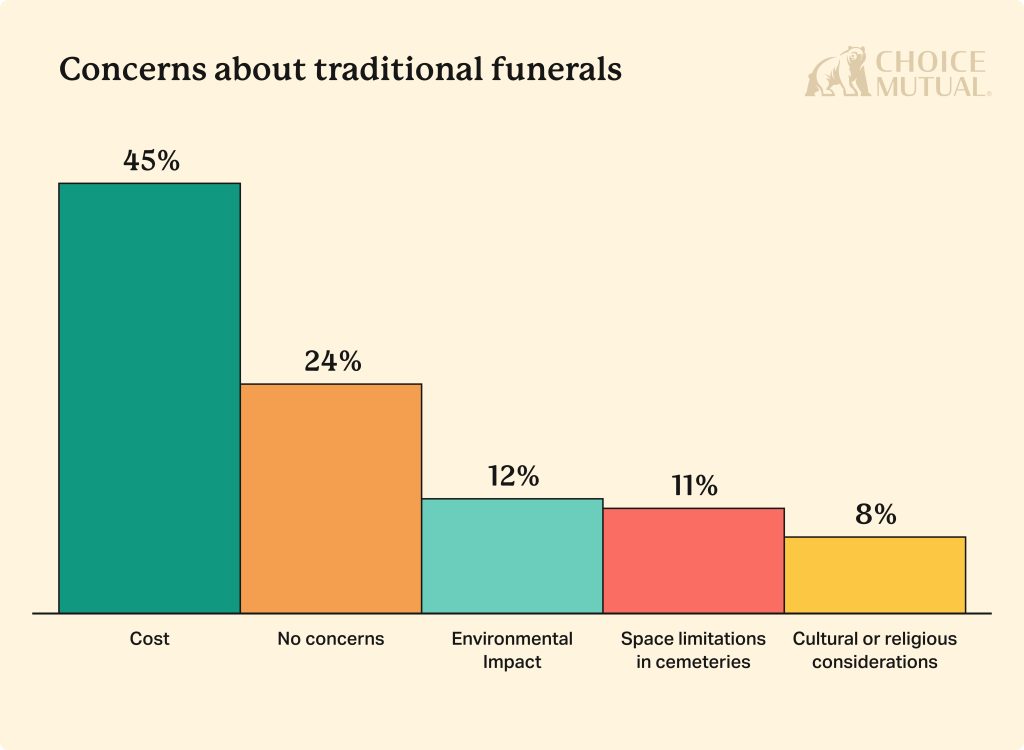
INDIANA – Since immemorial, contemplating one’s funeral has been an inherently awkward yet unavoidable aspect of life. Traditionally, the decision seemed straightforward: burial or cremation. But as our society’s values shift, so do the ways we consider for our post-mortem journey.
The trend towards environmentally conscious funeral options is rising as awareness spreads. In response to this shift, Choice Mutual surveyed 6,000 people to gauge preferences for non-traditional burial methods. The findings were revealing, highlighting a growing interest in eco-friendly funeral alternatives.

#1 Human Composting
First came Natural Organic Reduction (Human Composting). This method involves placing the body in a vessel with organic materials like wood chips and straw. Over several weeks, the body decomposes naturally, turning into nutrient-rich soil.
#2 Green Burials
The 2nd most popular option among Hoosiers was Green Burials. This method skips the embalming process and uses biodegradable caskets or shrouds. The aim is to allow the body to decompose naturally and return to the earth without harming the environment.
#3 Tree Pod Burials
A surprising choice emerged as the 3rd most popular for Hoosier State residents: Tree Pod Burials. The body is placed in a biodegradable pod and buried in the ground. A tree is planted above the pod, and as the body decomposes, it nourishes the tree.
#4 Memorial Reefs
Memorial Reefs was the 4th most popular pick. This involves creating artificial coral reefs using remains mixed into environmentally safe cement. These reefs provide habitats for marine life and help restore endangered coral ecosystems. An alternative approach is to create a reef ball from the cremated remains.
#5 Mushroom Suits
Rounding up the top 7 among Indiana residents were Mushroom Suits. These involve a biodegradable burial suit or shroud embedded with mushroom spores. The mushrooms decompose the body and neutralize toxins released during decomposition.
#6 Space Burials
Space Burials, which came in sixth place, is an avant-garde choice that involves sending ashes into orbit. It didn’t place as the top pick, likely due to environmental concerns about space debris.
#7 Aquamation
Aquamation (Alkaline Hydrolysis) was the 7th most sought-after method. Also known as water cremation, this process uses water and lye to break down the body. It’s more eco-friendly than traditional cremation since it uses less energy and releases fewer emissions.
Choice Mutual decided to delve deeper into people’s options about alternative burial methods.
With personal debt in America soaring, 45% cite the high costs associated with traditional funerals — typically between $7,000 and $12,000 — as the primary concern. These expenses often cover a range of services, including casket purchase, service fees, burial vault, and costs for the gravesite and its preparation, not to mention headstones and funeral ceremonies.
Environmental impact is another significant concern, with 12% of those surveyed prioritizing it, closely followed by the issue of cemetery space, which concerns 11% of respondents.

Hoosiers were queried about their likelihood of choosing a cost-saving alternative burial method over traditional ones, with many indicating a propensity to switch to reduce expenses.
Discussions about funeral plans, especially with older family members, remain a sensitive subject, with 39% feeling uneasy about it. Yet, a striking 72% would back a relative’s decision to choose an alternative method, although 9% might dissuade them, and 19% would remain neutral.
Regarding funeral funding, 39% of respondents expect life insurance to cover the costs. Personal savings are the anticipated source for 29%, while 11% may rely on family contributions. A small fraction, 3%, even consider crowdfunding as an option.
In a notable reflection of celebrity influence, nearly one-third of Hoosiers polled concede that endorsement by a celebrity could sway their decision towards an alternative burial, underscoring the power of social media promotion, a tactic more commonly seen in industries far removed from funeral services.

“We’re observing a significant shift in end-of-life preferences as people seek to leave a lasting, positive impact on the planet,” says Anthony Martin from Choice Mutual. “It’s about connecting with the earth and fulfilling a legacy that honors environmental values and personal beliefs. These eco-friendly options offer a way to say farewell that aligns with the principles people lived by, ensuring that their final footprint is as green and meaningful as the life they led.”
Information: Choice Mutual.









.png)











